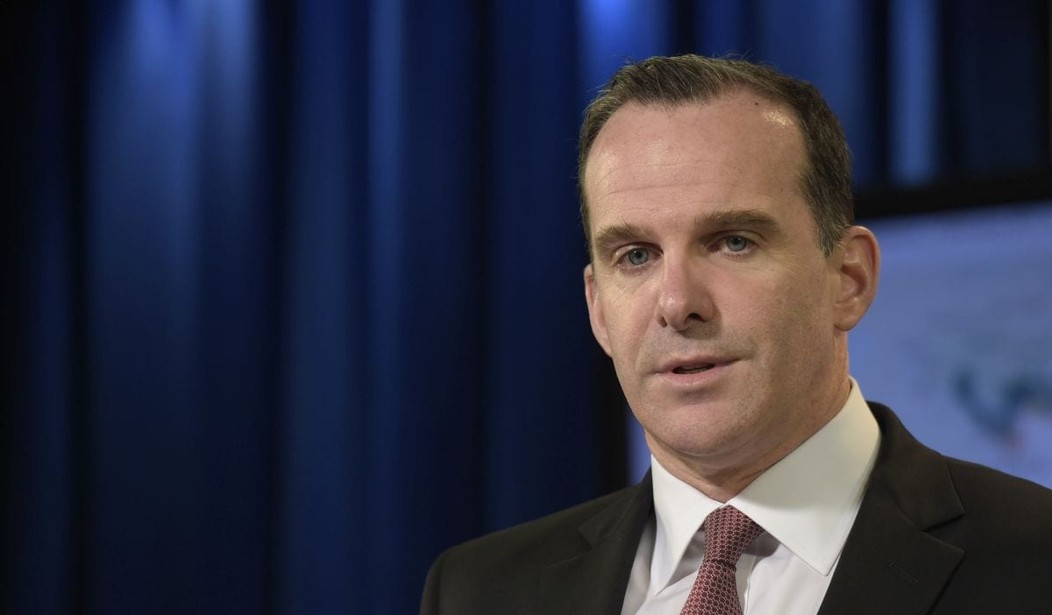Brett McGurk, the administration’s envoy to the coalition fighting ISIS, has resigned in protest over Donald Trump’s abrupt decision to withdraw U.S. forces from Syria.
McGurk was reportedly going to leave the administration anyway in February but decided to leave now after the president announced the U.S. Syrian withdrawal this week.
Only 11 days ago, McGurk had said it would be “reckless” to consider IS defeated and therefore would be unwise to bring American forces home. McGurk decided to speed up his original plan to leave his post in mid-February.
Appointed to the post by President Barack Obama in 2015 and retained by Trump, McGurk said in his resignation letter that the militants were on the run, but not yet defeated, and that the premature pullout of American forces from Syria would create the conditions that gave rise to IS. He also cited gains in accelerating the campaign against IS, but that the work was not yet done.
His letter, submitted Friday to Secretary of State Mike Pompeo, was described to The Associated Press on Saturday by an official familiar with its contents. The official was not authorized to publicly discuss the matter before the letter was released and spoke on condition of anonymity.
In a tweet shortly after news of McGurk’s resignation broke, Trump again defended his decision to pull all of the roughly 2,000 U.S. forces from Syria in the coming weeks.
“We were originally going to be there for three months, and that was seven years ago – we never left,” Trump tweeted. “When I became President, ISIS was going wild. Now ISIS is largely defeated and other local countries, including Turkey, should be able to easily take care of whatever remains. We’re coming home!”
The resignation of Defense Secretary Jim Mattis was about more than Trump’s Syrian withdrawal, but it certainly sped up his departure. What’s surprising is that other members of the president’s national security team haven’t followed Mattis and McGurk’s example. The president apparently forgot/didn’t bother/didn’t think it was necessary to inform his foreign policy and defense advisers of the Syrian pullout.
Trump is exaggerating when he says ISIS was “running wild” in January 2017 when he took office. By then, the terrorists had been kicked completely out of Iraq and were losing their territory in Syria. He’s also exaggerating when he claims ISIS is “defeated.”
He might want to ask the Kurds about that.
The Islamic State group launched an attack on Friday on Syrian Democratic Forces’ positions in Hajin region in southeastern Syria, Mustafa Bali, the head of the SDF media office said.
“ISIS is launching a huge attack, heavy clashes are taking place there,” he tweeted. “Only 35 percent percent from Hajin is liberated by our forces.”
Meanwhile, top Syrian Kurdish official Ilham Ahmed said Kurdish-led forces in northern Syria may not be able to continue hold Islamic State prisoners if the situation in the region gets out of control.
Speaking alongside her at a Paris news conference, Riad Darar, co-chair of the Syrian Democratic Council, said they hoped France would play a more active role in Syria after U.S. President Donald Trump decided to withdraw U.S. forces.
“Under the threat of the Turkish state, and with the possibility of Daesh (Islamic State) reviving once again, I fear the situation will go out of control and we no longer be able to contain them,” Ahmed said when asked if the SDF was considering releasing hundreds of IS detainees.
President Obama declared victory in Iraq and brought the troops home, despite grave warnings that the move threatened stability and peace in the country. Those fears never materialized, so perhaps we should take the warnings about U.S. Syrian involvement with a little skepticism.
Trump doesn’t need advisers to tell him what to do. He will govern as he has from the beginning — shooting from the hip with little thought to the long-term consequences of his decisions. As long as it worked, few complained. And no one can say whether or not this decision will lead to disaster or not.
McGurk and Mattis apparently had enough of Trump’s ad hoc foreign policy and have left.










Join the conversation as a VIP Member